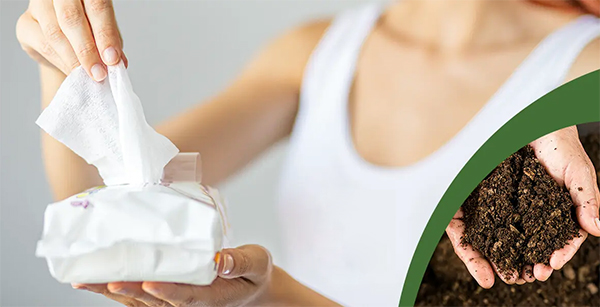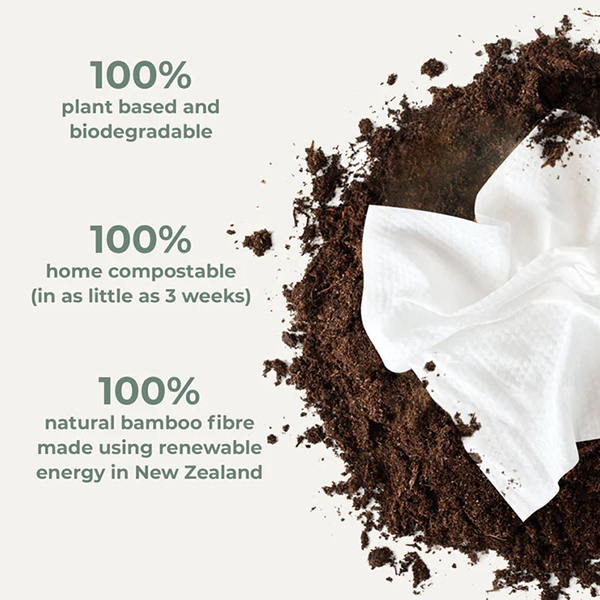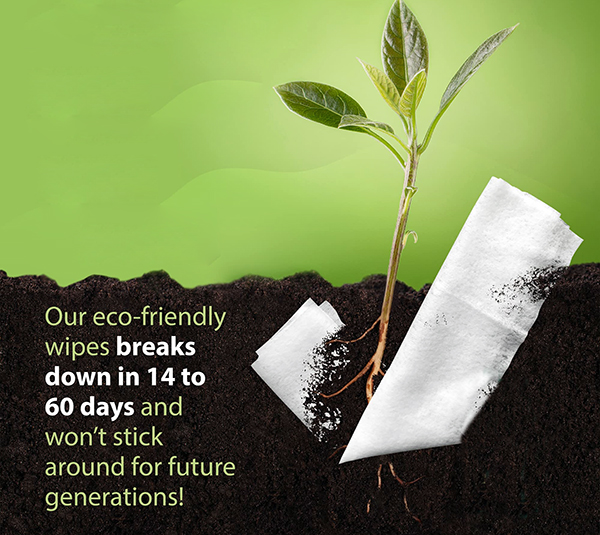+86-18927501869
- All
- Product Name
- Product Keyword
- Product Model
- Product Summary
- Product Description
- Multi Field Search
 English
EnglishViews: 1379 Author: Joe Publish Time: 2025-01-26 Origin: Site

In today's world, environmental consciousness is at the forefront of consumer decisions. More people are moving towards sustainable living, seeking products that not only meet their needs but also help in reducing their environmental impact. Wet wipes, often seen as an essential item for personal hygiene, baby care, cleaning, and on-the-go freshness, have long been a source of concern due to their non-biodegradable nature. As the demand for eco-friendly alternatives increases, biodegradable wet wipes have emerged as a practical solution.
What makes biodegradable wet wipes different? Traditional wet wipes are usually made from synthetic materials like polyester and polyethylene, which can take hundreds of years to break down in a landfill. Biodegradable wet wipes, however, are made from materials that decompose naturally and quickly, making them an eco-friendly choice that doesn't burden the planet.
The global push towards sustainability is reshaping the way we live. Consumers are more aware of the environmental implications of their purchases and are actively looking for eco-friendly alternatives. Biodegradable wet wipes are a key part of this trend, offering a responsible solution for personal hygiene and cleaning without contributing to long-term waste.
Unlike traditional wet wipes, which are made from plastics, biodegradable wet wipes use natural fibers like bamboo, cotton, or other plant-based materials. These fibers are not only renewable but also biodegradable, meaning they break down over time, causing minimal harm to the environment.
Materials Commonly Used in Biodegradable Wet Wipes:
Bamboo fibers are a popular choice for biodegradable wet wipes due to their sustainability and rapid growth. Bamboo is a renewable resource that requires minimal water and no pesticides to thrive. Bamboo-based wipes are soft, absorbent, and biodegradable, making them an eco-friendly option.
Wood pulp, derived from sustainably managed forests, is another common material used in biodegradable wet wipes. It is biodegradable and compostable, breaking down naturally without leaving harmful residues. Wood pulp-based wipes are soft, durable, and suitable for sensitive skin.
Plant-based cellulose, obtained from sources such as cotton or eucalyptus, is biodegradable and environmentally friendly. Cellulose fibers are naturally absorbent and gentle on the skin, making them ideal for wet wipes. Plant-based cellulose wipes decompose easily, reducing their environmental impact.
Eco-Friendly Alternatives and Their Benefits:
Biodegradable wet wipes made from bamboo fibers, wood pulp, or plant-based cellulose have a significantly lower environmental footprint compared to wipes made from non-biodegradable materials. These eco-friendly alternatives help minimize waste accumulation in landfills and reduce pollution in water bodies.
Bamboo, wood pulp, and plant-based cellulose are renewable resources that can be sustainably harvested without depleting natural ecosystems. Choosing wipes made from these materials promotes the use of sustainable resources and supports responsible forestry practices.
Biodegradable wet wipes made from eco-friendly materials decompose naturally, returning to the earth without leaving behind harmful residues. They are compostable, allowing them to be recycled back into the soil to enrich the environment.
Eco-friendly alternatives used in biodegradable wet wipes are gentle and non-irritating, making them suitable for sensitive skin, including babies and individuals with allergies or sensitivities. These wipes provide effective cleansing without compromising on comfort or safety.
In conclusion, biodegradable wet wipes made from bamboo fibers, wood pulp, or plant-based cellulose offer a sustainable solution to personal hygiene needs. By opting for wipes crafted from eco-friendly materials, consumers can contribute to environmental conservation while enjoying the benefits of gentle, effective cleansing.

Biodegradable wet wipes offer the same convenience as their non-biodegradable counterparts. Whether it's cleaning up after a meal, freshening up during travel, or ensuring your baby stays clean and comfortable, biodegradable wet wipes provide the same ease of use. The only difference? You're making a responsible choice that benefits the planet.
Whether you're at home or on the go, maintaining hygiene is essential. Biodegradable wet wipes are designed to be gentle on the skin, making them suitable for all ages, including babies. They are typically free from harsh chemicals, alcohol, and artificial fragrances, making them a safer, more comfortable option for sensitive skin.
One of the most significant concerns with conventional wet wipes is their contribution to landfill waste. According to studies, wet wipes make up a significant portion of urban waste, with billions of them being used globally every day. Unfortunately, most of these wipes do not biodegrade, leading to environmental pollution.
Biodegradable wet wipes, on the other hand, break down quickly, reducing waste and promoting a cleaner planet. By choosing biodegradable options, consumers can help decrease the overall waste load, ensuring fewer wipes end up in landfills, oceans, or rivers.

The key to a truly biodegradable wet wipe is the material it's made from. Look for wipes made from plant-based fibers such as bamboo, organic cotton, or hemp. These materials are both sustainable and biodegradable, breaking down naturally without leaving a harmful impact on the environment.
The environmental impact doesn't end with the product itself. Packaging plays a crucial role in the sustainability of wet wipes. Options for brands that use recyclable or compostable packaging to minimize waste and promote a circular economy.
Certification labels, such as "Certified Biodegradable" or "Organic", can help you identify products that are genuinely eco-friendly. These labels often come from trusted third-party organizations that ensure the product meets certain environmental and sustainability standards.
While biodegradable products are generally understood to be eco-friendly, it's important to delve into the science behind their decomposition. Biodegradable wet wipes are designed to break down through natural biological processes. The fibers used in these wipes are broken down by microorganisms, ensuring they don't contribute to long-term pollution.
However, it's important to note that "biodegradable" doesn't mean "instantaneously breaks down." Biodegradable wet wipes still need the right conditions to break down completely, such as sufficient moisture, oxygen, and warmth. This process is much quicker than traditional synthetic fibers, but it still takes time.

Some consumers believe that biodegradable wipes still contribute to environmental pollution. However, this is not the case. While no product is 100% free of environmental impact, biodegradable wet wipes are a far better option than conventional wipes. They break down faster, reducing the amount of waste left in landfills or waterways.
With growing consumer demand, biodegradable wet wipes are becoming more affordable. In fact, many brands offer competitive prices without compromising on quality. Additionally, the long-term environmental benefits outweigh the initial cost difference, making it a smart investment for both your health and the planet.
Biodegradable wipes are engineered to decompose in various environments, including landfills. However, the decomposition process may take longer in a landfill due to limited oxygen and microbial activity. Nevertheless, biodegradable wipes will eventually break down into harmless substances in landfill conditions.
The transition to biodegradable wet wipes is not just about making a responsible choice for the planet—it's about aligning with a global shift towards sustainability. As consumers become more eco-conscious, the demand for eco-friendly hygiene solutions continues to rise. By choosing biodegradable wet wipes, you're not only benefiting from a high-quality, safe, and convenient product but also helping reduce your environmental footprint.
Are you ready to make the change? Choose biodegradable wet wipes for a cleaner, more sustainable future.
For more information about our range of biodegradable wet wipes, please visit Clean-Wipe.com. Join the movement for cleaner, greener hygiene solutions today!
Sywipe seizes every opportunity to use high-quality resources, including peer-reviewed research, to support the facts in our article. Learn more about our factory and how to keep the content accurate, reliable, and trustworthy.
• How to Choose Flushable Biodegradable Wet Wipes?
• 14 Best Camping Body Wipes to Keep You Fresh in 2024
• Why Natural Baby Wipes are Essential for Newborn Skin Care?
Our Customers Always Come First
Trust is the Foundation of Our Service
sales@clean-wipe.com
sywipe@clean-wipe.com
Room 4611, No. 372 Huanshi East Road, Yuexiu District, Guangzhou,China.
+86-18927501869 / +86-20-81608597
/ +86-18927501869